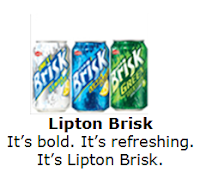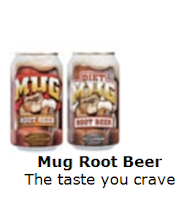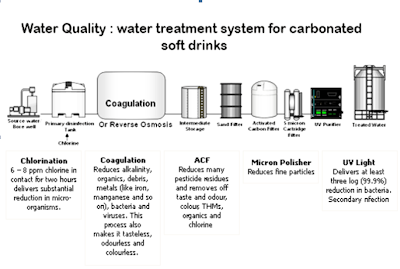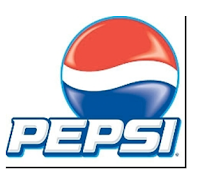Marketing Mix of
Pepsi
Pepsi Company is one of the world's
largest food and beverage companies, with 2007 annual revenues of more than $39
billion. The company employs approximately 185,000 people worldwide, and its
products are sold in approximately 200 countries through four P's of the
Marketing Mix which are following.
1. Product
2. Promotion
3. Place
4. Price
1. Pepsi Products
Variety
Quality
Pepsi follows one quality standard across the globe.
Pepsi has a long-standing commitment to protecting the consumers whose
trust and confidence in its products is the bedrock of its success. In order to
ensure that consumers stay informed about the global quality of all Pepsi
products sold in World, Pepsi products carry a quality assurance seal on
them. The ‘One Quality Worldwide’
assurance seal appears on the entire range of Pepsi’s beverages.
Composition of a Sugar-containing Soft Drink
· Water: 86-90%
· Sugar: 10-13%
· CO2: 0.3-0.7%
· Concentrate: 0.2-0.4%
Water Quality: Incoming Water
Water accounts for the bulk of all beverages including colas. In other words, the water used in PepsiCo soft drinks must be as safe as possible for human consumption.
How do Pepsi ensure this?
· Every water source used for PepsiCo
beverages must first be analytically qualified, which includes using accredited
laboratories to test for at least 100 parameters
· Pepsi flavor concentrates, which make up
less than 1% of Pepsi finished beverages, also are diligently controlled
· Each supplier must submit written
verification that each lot of ingredient shipped to Pepsi facilities meets
Pepsi strict specifications
· In addition to water, sugar, and flavor
testing, other ingredients, including non agricultural have been analyzed by
outside laboratories
· All ingredients including flavors,
emulsifiers, preservatives, colors, acidulants, anti-oxidants and low-calorie
sweeteners are food grade and have been approved by global food standards like
the JECFA/CODEX, USFDA and EU Scientific Committee for Foods. All ingredients
used also conform to standards laid out by the Prevention of Food Adulteration
Act under the health ministry
· Sugar accounts for 10 to 13% of a soft
drink
· Sugar must meet high standards of
quality, which are uniform for all of Pepsi beverage plants across the globe.
All of Pepsi sugar manufacturers must undergo the same supplier qualification
process
· To add to Pepsi already high quality
standards, all of Pepsi plants in World further purify sugar with hot activated
carbon and fine filtration.
Quality of sugar
At Pepsi, sugar is bought only from approved sugar mills after a rigorous supplier qualification process described below:
At Pepsi, sugar is bought only from approved sugar mills after a rigorous supplier qualification process described below:
Self Assessment
|
Perform self-assessment tool to evaluate
current sugar situation and knowledge base
|
Paper Audit
|
· Provide
supplier with Pepsi sugar specification
· Get requests
into from supplier:
o Type of sugar
o Manufacturing
flow chart
o Supplier's
Quality process & checkpoints
· Supplier
submits information
·
Quality and
Procurement review supplier data & if complete, proceed to next stage
|
Sample
Submission
|
· Supplier to
send test sample to independent outside lab
· Lab informs
supplier of results
· Supplier shares
data with Pepsi
·
Review data
& decide whether to proceed to the next stage
|
On-site Audit
|
· Audit
supplier's plant
· Review their
quality procedures
· Determine
ability to supply COC/COA
·
Ensure that the
supplier is capable & willing to consistently comply with the Pepsi sugar
specifications
|
Conditional
Approval
|
· "Conditional"
approval
· Supplier can
being supplying from approved refinery
· Pepsi or
outside lab tests first 10 deliveries against COA
· Supplier
submits sample from beginning, middle and end of session to outside lab
·
Pepsi/supplier
share results of analyses
|
Full Approval
|
" Final approval status granted after
supplier has met COA requirements on 10 separate lots of sugar and has
submitted sample from beginning, middle and end of production session to an
outside lab and all have been approved
|
Maintain
Approved Status
|
· Supplier sends
sample from beginning, middle and end of production season to outside lab for
complete analysis
· Lab informs
supplier of results
· If sample
fails, Pepsi & Supplier meet to develop corrective action plan
·
If problem is
not solved, revocation of "Approval" & shipments are halted
|
After sugar is received in the beverage plant, it is subjected to
further treatment to reduce impurities, colour, odour, and microbes to achieve
Pepsi's Global Specifications. Note, however, that white milled sugar has no
standard for pesticide residue as it is a processed agri-product.
|
· The CO2 in each
bottle of Pepsi surpasses that recognised for medical applications.
· Pepsi achieve
this by subjecting each supplier to a rigorous supplier qualification
process, which includes a complete audit of refineries and testing from
approved international laboratories
· Further, each
batch carries certificates of analysis and compliance
·
Once the CO2
reaches a bottling plant, it undergoes further purification
|
Summary
· Pepsi products
are safe
· Pepsi analyze
water, sugar and flavorings in accordance with the best international
guidelines
· Pepsi products
comply with most stringent international regulations, including the new
regulations for carbonated soft.
Design
|
Packaging
2. Pepsi Promotion
Promotion is a key element of marketing
program and is concerned with effectively and efficiently communicating the
decisions of marketing strategy, to favorably influence target customers’
perceptions to facilitate exchange between the marketer and the customer that
may satisfy the objective of both customer and the company.
A company’s promotional efforts are the only controllable means to
create awareness among public about itself, the products and services it
offers, their features and influence their attitudes favorably.
Advertising
Advertising is any paid form of non-personal mass communication through
various media to present and promote product, services and ideas etc. by an
identified sponsor.
PepsiCo has advertised its products through many different ways and
media. Through TV we have seen different advertisements of its products such as
Pepsi or Dew. PepsiCo also advertise its products by targeting those favorable
television programs, like sports, series and also PepsiCo uses some events like
“Pepsify Karogey?” to promote its
products.
Through newspapers like Jung and Dawn, PepsiCo has advertised a wide
range of products it offers to its customers. And also through Posters a
message has been sent to a lot of people to be aware of the products which
PepsiCo offers.
3.
Pepsi Place
Decisions with respect to distribution
channel focus on making the product available in adequate quantities at places
where customers are normally expected to shop for them to satisfy their needs.
Depending on the nature of the product, marketing management decides to put
into place an exclusive, selective or intensive network of distribution, while
selecting the appropriate dealers or wholesalers.
·
Direct distribution:
o
Delivery of post
mix cylinders & handling of key accounts: The key accounts are different
wholesalers, restaurants and hotels like Pizza Hut, KFC, Metro which serve as a
place for key sale. These are known as national key accounts and are very
important in terms of competition.
o
Export Parties
·
Indirect distribution:
o
Through Base
market distributors
o
Through
Outstation distributors
Before delivering the product some certain
guiding principles are followed for the assessment of distributor’s capability:
·
Applicant must
have 20 to 25 vehicles (depending on the area).
·
Applicant must
have 20,000 cases of empty bottles.
·
Applicant must
deposit Rs.1, 000,000 as a security.
This is usually done through taking over key
revenue areas. If the distributor does not achieve its sales target, the
distribution is taken back and an addition of new distributor is done.
Therefore Pepsi’s supply is low supply uncertainty. Some of its supply source
capabilities are:
·
Less breakdowns
·
High quality
·
Flexible supply
capacity
·
Mature production
process
4. Pepsi Price
Pricing decisions are almost always made
in consultation with marketing management. Price is the only marketing mix
variable that can be altered quickly. Price variables such as dealer price,
retail price, discounts, allowances, credit terms etc. influence the
development of marketing strategy, as price is a major factor that influences
the assessment of value obtained by customers.
Customers directly relate price to quality, particularly in case of
products that are ego intensive of technology based. Pepsi being a company
which emphasizes product quality, it tends to sell its products with price
range from moderately low to high prices, depending on the use and the targeted
customers.
Sample List of Price
Regular Pepsi
(250 ml)
Rs. 15/-
|
Pepsi Can (300
ml)
Rs. 25/-
|
Pepsi
Disposable (500 ml)
Rs. 25/-
|
Pepsi (1 Liter)
Rs. 30/-
|
Pepsi (1.5
Liter)
Rs. 50/-
|
Pepsi (2.25
Liter)
Rs. 60/-
|




























Useful Things...
ReplyDelete